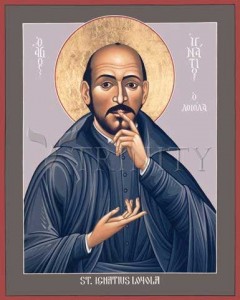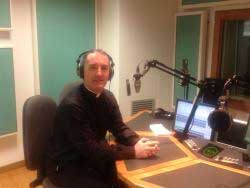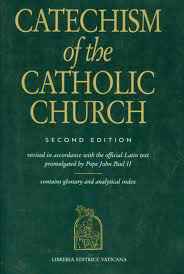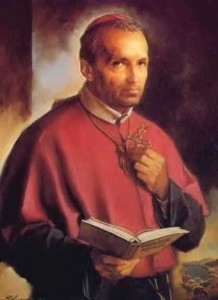VATICAN CITY, 16 FEB 2011 (VIS) – In his general audience today, held in the Paul VI Hall, the Pope focused his attention on St. John of the Cross, “spiritual friend to St. Teresa and, with her, reformer of the Carmelite religious family. Proclaimed a Doctor of the Church by Pius XI in 1926, he is traditionally known as the ‘Doctor mysticus’, the Mystical Doctor”, the Holy Father said.
John was born to a poor family at Fontiveros near the Spanish town of Avila in 1542 and entered the Carmelite order at Medina del Campo. Ordained a priest in 1567, it was on the occasion of his first Mass that he met Teresa, “who explained to him her plan for the reform of the Carmelites”. In his renewal of his religious profession John took the name “of the Cross” and collaborated enthusiastically in the process of reform, something “which brought him great suffering”, and even led to his imprisonment following an unjust accusation. While preparing a journey to Mexico he fell seriously ill and died in December 1591. He was beatified by Clement X in
1675 and canonised by Benedict XIII in 1726.
St. John of the Cross, said Benedict XVI, “is considered one of most important lyric poets of Spanish literature. He wrote four major works: ‘Ascent of Mount Carmel’, ‘Dark Night of the Soul‘, ‘Spiritual Canticle’ and ‘Living Flame of Love‘.
“In his ‘Spiritual Canticle’ St. John outlines the soul’s journey of purification”, the Holy Father added. “The ‘Living Flame of Love’ continues in the same line, describing in greater detail the condition of union with God. … ‘Ascent of Mount Carmel’ outlines the spiritual itinerary from the point of view of a progressive purification of the soul, which is necessary in order to scale the heights of Christian perfection, symbolised by the summit of Mount Carmel”.
The Pope continued his catechesis by explaining how “the ‘Dark Night of the Soul’ describes the ‘passive’ aspect; in other words, God’s contribution to the process of purifying the soul. Human effort alone, in fact, is incapable of reaching the deepest roots of a person’s bad inclinations and habits. It can halt them but not eradicate them completely. To do this, we need a special action by God which radically purifies the spirit and disposes it to the union of love with Him“.
“The rate of increase of faith, hope and charity goes hand in hand with the work of purification and with progressive union with God, until attaining transformation into Him. When this goal is reached, the soul is immersed in Trinitarian life itself. … This is why the Mystical Doctor held that there is no true union of love with God that does not culminate in Trinitarian union”.
The Pope completed his remarks by asking whether the life of St. John of the Cross has anything to say to everyday Christians, or whether it is an example only for the few select souls who can follow the path of purification and mystical ascesis. “The journey with Christ, travelling with Christ … is not an additional weight to the already sufficiently-heavy burden of our lives”, he said. “It is something totally different. … It is a light, a power which helps us carry our everyday burden. … Allowing ourselves to be loved by Christ is the light which helps us to carry the daily burden, and sanctity is not a task we must accomplish on our own, a very difficult task. … Let us ask God to help us become saints, to allow ourselves to be loved by God, which is the vocation and true redemption of us all”.
Published by VIS – Holy See Press Office – Wednesday, February 16, 2011
Tags: ascent of mount carmel, carmelite order, carmelites, dark night of the soul, doctor of the church, family, heart, holy father, hope, love, Mystical Doctor, purification of the soul, spanish literature, spiritual friend, st. john of the cross, union with god
This entry was posted on Friday, December 14th, 2012 at 12:19 am
You can follow any responses to this entry through the RSS 2.0 feed.
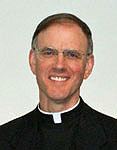 Episode 6 “What am I to do?†The Discernment of God’s Will in Everyday Decisions w/Fr. Timothy Gallagher
Episode 6 “What am I to do?†The Discernment of God’s Will in Everyday Decisions w/Fr. Timothy Gallagher
This episode offers Fr. Gallagher discusses the call to the marriage vocation and the call to the religious life. Â What are the differences found in each and how do we begin to discern our call.
For other episodes in the series visit The Discerning Hearts “Discerning the Will of God†page
Father Timothy M. Gallagher, O.M.V., was ordained in 1979 as a member of the Oblates of the Virgin Mary, a religious community dedicated to retreats and spiritual formation according to the Spiritual Exercises of St. Ignatius. Â Fr. Gallagher is featured on the EWTN series “Living the Discerning Life: Â The Spiritual Teachings of St. Ignatius of Loyola”.
For more information on how to obtain copies of Fr. Gallaghers’s various books and audio which are available for purchase, please visit  his  website:   frtimothygallagher.org
For the other episodes in this series check out Fr. Timothy Gallagher’s “Discerning Hearts†page
Tags: Father Timothy M. Gallagher, Gallagher, Timothy Gallagher
This entry was posted on Thursday, December 13th, 2012 at 7:27 am
You can follow any responses to this entry through the RSS 2.0 feed.
In part two of our series answering listeners questions of faith, Monsignor John Kennedy, an official at the Congregation for the Doctrine of the Faith, answers a question from the USA on the pace we should apply to reading the Catechism of the Catholic Church; from the UK on why we are baptised as infants and not later on in life; and reveals a little known fact regarding who can minister the Sacrament of Baptism
Listen: [powerpress]
Tags: baptism, Monsignor John Kennedy, UK, vatican radio
This entry was posted on Thursday, December 13th, 2012 at 7:17 am
You can follow any responses to this entry through the RSS 2.0 feed.
Episode 11 -The Way of Mystery: The Eucharist and Moral Living– The Liturgy of the Eucharist part 3 : The Eucharistic Prayer…God teaching us to pray. What are we doing in our participation and are we truly ready to receive the Body of Christ? Should we, in integrity, receive the Truth of Christ in Communion…do we really believe?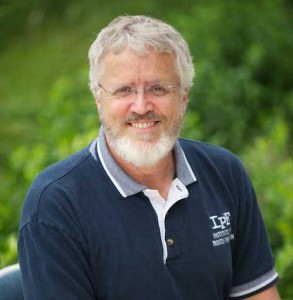
[powerpress]
Deacon James Keating, PhD, the director of Theological Formation for the Institute for Priestly Formation, located at Creighton University, in Omaha, is making available to â€Discerning Hearts†and all who listen, his series of programs entitled “The Way of Mysteryâ€.
 The Vatican II documents remind us that the spiritual journey is not made in a vacuum, that God has chosen to save us, not individually, but as The People of God. The Eucharist must help Christians to make their choices by discerning out of Christ’s paschal mystery. For this process to take place, however, Christians must first understand how the Eucharist puts them in touch with Christ’s passion, death, and resurrection, and what concrete implications being in touch with this mystery has for their daily lives.
The Vatican II documents remind us that the spiritual journey is not made in a vacuum, that God has chosen to save us, not individually, but as The People of God. The Eucharist must help Christians to make their choices by discerning out of Christ’s paschal mystery. For this process to take place, however, Christians must first understand how the Eucharist puts them in touch with Christ’s passion, death, and resurrection, and what concrete implications being in touch with this mystery has for their daily lives.
For more information on the “Institute of Priestly Formation†and for other material available by Deacon Keating, just click here
Don’t forget to pickup a copy of “Communion with Christ†, it is one of the best audio sets on prayer…ever!
Check out Deacon Keating’s “Discerning Heart†page
Tags: choices, creighton university, Deacon James Keating, Deacon Keating, institute for priestly formation
This entry was posted on Monday, December 10th, 2012 at 7:48 am
You can follow any responses to this entry through the RSS 2.0 feed.
Episode 9 -The Way of Mystery: The Eucharist and Moral Living–  The Liturgy of the Eucharist part 1 : The offertory and the priesthood…what is the role of the priest in the sacrifice of the Mass and what are some of the challenges faced by the priest today.
[powerpress]
Deacon James Keating, PhD, the director of Theological Formation for the Institute for Priestly Formation, located at Creighton University, in Omaha, is making available to â€Discerning Hearts†and all who listen, his series of programs entitled “The Way of Mysteryâ€.
 The Vatican II documents remind us that the spiritual journey is not made in a vacuum, that God has chosen to save us, not individually, but as The People of God. The Eucharist must help Christians to make their choices by discerning out of Christ’s paschal mystery. For this process to take place, however, Christians must first understand how the Eucharist puts them in touch with Christ’s passion, death, and resurrection, and what concrete implications being in touch with this mystery has for their daily lives.
The Vatican II documents remind us that the spiritual journey is not made in a vacuum, that God has chosen to save us, not individually, but as The People of God. The Eucharist must help Christians to make their choices by discerning out of Christ’s paschal mystery. For this process to take place, however, Christians must first understand how the Eucharist puts them in touch with Christ’s passion, death, and resurrection, and what concrete implications being in touch with this mystery has for their daily lives.
For more information on the “Institute of Priestly Formation†and for other material available by Deacon Keating, just click here
Don’t forget to pickup a copy of “Communion with Christ†, it is one of the best audio sets on prayer…ever!
Check out Deacon Keating’s “Discerning Heart†page
Tags: choices, creighton university, Deacon James Keating, institute for priestly formation, paschal mystery, priesthood
This entry was posted on Monday, November 26th, 2012 at 8:33 am
You can follow any responses to this entry through the RSS 2.0 feed.
Episode 8 -The Way of Mystery: The Eucharist and Moral Living– The Liturgy of the Word part 2 : The actual role of the reader (not performer), the role of the deacon, the role of those who hear the Word
[powerpress]
Deacon James Keating, PhD, the director of Theological Formation for the Institute for Priestly Formation, located at Creighton University, in Omaha, is making available to â€Discerning Hearts†and all who listen, his series of programs entitled “The Way of Mysteryâ€.
 The Vatican II documents remind us that the spiritual journey is not made in a vacuum, that God has chosen to save us, not individually, but as The People of God. The Eucharist must help Christians to make their choices by discerning out of Christ’s paschal mystery. For this process to take place, however, Christians must first understand how the Eucharist puts them in touch with Christ’s passion, death, and resurrection, and what concrete implications being in touch with this mystery has for their daily lives.
The Vatican II documents remind us that the spiritual journey is not made in a vacuum, that God has chosen to save us, not individually, but as The People of God. The Eucharist must help Christians to make their choices by discerning out of Christ’s paschal mystery. For this process to take place, however, Christians must first understand how the Eucharist puts them in touch with Christ’s passion, death, and resurrection, and what concrete implications being in touch with this mystery has for their daily lives.
For more information on the “Institute of Priestly Formation†and for other material available by Deacon Keating, just click here
Don’t forget to pickup a copy of “Communion with Christ†, it is one of the best audio sets on prayer…ever!
Check out Deacon Keating’s “Discerning Heart†page
Tags: choices, creighton university, deacon, Deacon James Keating
This entry was posted on Monday, November 19th, 2012 at 12:33 pm
You can follow any responses to this entry through the RSS 2.0 feed.
Episode 7 -The Way of Mystery: The Eucharist and Moral Living– The Liturgy of the Word part 1 Christ entering us through language. The difference in our attitude of being an “audience” and being in an attitude of prayer. How the Word sets us free.
[powerpress]
Deacon James Keating, PhD, the director of Theological Formation for the Institute for Priestly Formation, located at Creighton University, in Omaha, is making available to â€Discerning Hearts†and all who listen, his series of programs entitled “The Way of Mysteryâ€.
 The Vatican II documents remind us that the spiritual journey is not made in a vacuum, that God has chosen to save us, not individually, but as The People of God. The Eucharist must help Christians to make their choices by discerning out of Christ’s paschal mystery. For this process to take place, however, Christians must first understand how the Eucharist puts them in touch with Christ’s passion, death, and resurrection, and what concrete implications being in touch with this mystery has for their daily lives.
The Vatican II documents remind us that the spiritual journey is not made in a vacuum, that God has chosen to save us, not individually, but as The People of God. The Eucharist must help Christians to make their choices by discerning out of Christ’s paschal mystery. For this process to take place, however, Christians must first understand how the Eucharist puts them in touch with Christ’s passion, death, and resurrection, and what concrete implications being in touch with this mystery has for their daily lives.
For more information on the “Institute of Priestly Formation†and for other material available by Deacon Keating, just click here
Don’t forget to pickup a copy of “Communion with Christ†, it is one of the best audio sets on prayer…ever!
Check out Deacon Keating’s “Discerning Heart†page
Tags: choices, creighton university, Deacon James Keating, prayer
This entry was posted on Tuesday, November 13th, 2012 at 2:41 pm
You can follow any responses to this entry through the RSS 2.0 feed.
Episode 5 -The Way of Mystery: The Eucharist and Moral Living– The penitential rite of the mass, while not the pivotal point , it is one of the most important points of the mass, and key in our moral conversion…it’s about the crucifixion to sin, meeting evil with love.
, it is one of the most important points of the mass, and key in our moral conversion…it’s about the crucifixion to sin, meeting evil with love.
[powerpress]
Deacon James Keating, PhD, the director of Theological Formation for the Institute for Priestly Formation, located at Creighton University, in Omaha, is making available to â€Discerning Hearts†and all who listen, his series of programs entitled “The Way of Mysteryâ€.
 The Vatican II documents remind us that the spiritual journey is not made in a vacuum, that God has chosen to save us, not individually, but as The People of God. The Eucharist must help Christians to make their choices by discerning out of Christ’s paschal mystery. For this process to take place, however, Christians must first understand how the Eucharist puts them in touch with Christ’s passion, death, and resurrection, and what concrete implications being in touch with this mystery has for their daily lives.
The Vatican II documents remind us that the spiritual journey is not made in a vacuum, that God has chosen to save us, not individually, but as The People of God. The Eucharist must help Christians to make their choices by discerning out of Christ’s paschal mystery. For this process to take place, however, Christians must first understand how the Eucharist puts them in touch with Christ’s passion, death, and resurrection, and what concrete implications being in touch with this mystery has for their daily lives.
For more information on the “Institute of Priestly Formation†and for other material available by Deacon Keating, just click here
Don’t forget to pickup a copy of “Communion with Christ†, it is one of the best audio sets on prayer…ever!
Check out Deacon Keating’s “Discerning Heart†page
Tags: institute for priestly formation, the eucharist, the mass
This entry was posted on Monday, October 29th, 2012 at 6:35 am
You can follow any responses to this entry through the RSS 2.0 feed.
USCCA23 Chapter 21 Â The Sacrament of Marriage Part 1
[powerpress]
Archbishop Lucas offers insights on the US Catholic Catechism for Adults Chapter21:
The first effect of the Sacrament of Matrimony is the gift of the bond between the spouses. “The consent by which the spouses mutually give and receive one another is sealed by God himself†(CCC, no. 1639). “The marriage bond has been established by God himself in such a way that a marriage concluded and consummated between baptized persons can never be dissolved†(CCC, no. 1640).
United States Conference of Catholic Bishops (USCCB)
The Most Reverend George J. Lucas leads the Archdiocese of Omaha.Â
For other episodes in the visit our Archbishop George Lucas page
This programs is based on:
More information can be found here.
We wish to thank the USCCB for the permissions granted for use of  relevant material used in this series.
Also we wish to thank Matt Willkomb for his vocal talents in this episode.
[ezcc]
Tags: marriage, united states catholic catechism for adults
This entry was posted on Monday, October 29th, 2012 at 6:30 am
You can follow any responses to this entry through the RSS 2.0 feed.
[powerpress = “Vatican_Radio”]
VATICAN CITY, SEPT. 12, 2012 (Zenit.org).- Here is a translation of the address Benedict XVI gave today in Paul VI Hall at the general audience. The Holy Father today continued his reflection on prayer in the book of Revelation.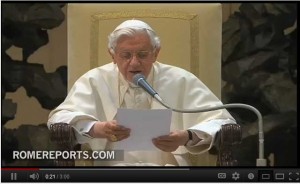
* * *
Dear brothers and sisters,
Last Wednesday I spoke about prayer in the first part of Revelation. Today we move on to the second part of the book; and whereas in the first part, prayer is oriented toward the Church’s inner life, in the second, attention is given to the entire world; the Church, in fact, journeys through history; she is part of it, in accordance with God’s plan.
The assembly that listened to John’s message presented by the reader rediscovered its duty to cooperate in the expansion of the Kingdom of God, as “priests of God and of Christ” (Revelation 20:6; cf. 1:5; 5:10) and it opens out to the world of men. And here, in the dialectical relationship that exists between them, two ways of living emerge: the first we may define as the “system of Christ,” to which the assembly is happy to belong; and the second, the “worldly systems opposed to the kingdom and the covenant and activated through the influence of the Evil One,” who by deceiving men wills to establish a world opposed to the one willed by Christ and by God (cf. Pontifical Biblical Commission, The Bible and Morality, Biblical Roots of Christian Conduct, 70).
The assembly must therefore know how to interpret in depth the history it is living, by learning to discern events with faith in order to cooperate by its action in the growth of the Kingdom of God. And this work of interpretation and discernment, as well as action, is linked to prayer.
First, after the insistent appeal of Christ, who in the first part of Revelation said seven times: “He who has an ear, let him hear what the Spirit says to the Church” (cf. Revelation 2:7,11,17,29; 3:6,13,22), the assembly is invited to ascend to Heaven, to look upon reality through God’s eyes; and here we discover three symbols, reference points from which we may begin to interpret history: the throne of God, the Lamb and the book (cf. Revelation4:1 – 5:14).
The first symbol is the throne, upon which there is seated a person John does not describe, for he surpasses every human representation. He is only able to note the sense of beauty and joy he experiences in His presence. This mysterious figure is God, God Almighty who did not remain enclosed within His heaven but who drew close to man, entering into a covenant with him; God who makes his voice — symbolized by thunder and lightning — heard in history, in a mysterious but real way. There are various elements that appear around the throne of God, such as the twenty-four elders and the four living creatures that unceasingly render praise to the one Lord of history.
The first symbol, then, is the throne. The second symbol is the book, which contains the plan of God for events and for men. It is hermetically sealed with seven seals, and no one is able to read it. Faced with man’s inability to scrutinize the plan of God, John experiences a deep sadness, which causes him to weep. But there is a remedy for man’s dismay before the mystery of history: there is one who is able to open the book and shed light on it.
And here the third symbol appears: Christ, the Lamb immolated in the sacrifice of the Cross, but who stands as a sign of his Resurrection. And it is the Lamb, Christ who died and rose, who gradually opens the seals and unveils the plan of God, the deep meaning of history.
What do these symbols tell us? They remind us of the path to knowing how to interpret the facts of history and of our own lives. By raising our gaze to God’s heaven in a constant relationship with Christ, by opening our hearts and our minds to him in personal and communal prayer, we learn to see things in a new way and to grasp their truest meaning. Prayer is like an open window that allows us to keep our gaze turned toward God, not only for the purpose of reminding us of the goal toward which we are directed, but also to allow the will of God to illumine our earthly journey and to help us to live it with intensity and commitment.
How does the Lord guide the Christian community to a deeper reading of history? First and foremost, by inviting it to consider with realism the present moment we are living. Therefore, the Lamb opens the four first seals of the book, and the Church sees the world in which it is inserted, a world in which various negative elements exist. There the evils that man commits, such as violence, which comes from the desire to possess, to prevail against one another to the point of killing one another (second seal); or injustice, as men fail to respect the laws that are given them (third seal). To these are added the evils that man must undergo, such as death, hunger and sickness (fourth seal). Faced with these oftentimes dramatic realities, the ecclesial community is invited to never lose hope, to believe firmly that the apparent omnipotence of the Evil One collides with the true omnipotence, which is God’s.
And the first seal the Lamb opens contains precisely this message. John narrates: “And I saw, and behold, a white horse, and its rider had a bow; and a crown was given to him, and he went out conquering and to conquer” (Revelation 6:2). The power of God has entered into the history of man, [a power] which is not only capable of offsetting evil, but even of conquering it. The color white recalls the Resurrection: God drew so near to us that he descended into the darkness of death in order to illumine it with the splendor of his divine life: he took the world’s evil upon himself in order to purify it with the fire of his love.
How do we grow in this Christian understanding of reality? Revelation tells us that prayer nourishes this vision of light and profound hope in each one of us and in our communities: it invites us to not allow ourselves to be overcome by evil, but to overcome evil with good, to look to the Crucified and Risen Christ, who associates us in his victory. The Church lives in history, she is not closed in on herself; but rather, she courageously faces her journey amid difficulties and suffering, by forcefully affirming that ultimately, evil does not conquer the good, darkness does not dim the splendor of God.
This is an important point for us; as Christians we can never be pessimists; we know well that along life’s journey we often encounter violence, falsehood, hate and persecution, but this does not discourage us. Above all, prayer teaches us to see the signs of God, of his presence and action; indeed, to be lights of goodness that spread hope and point out that the victory is God’s.
Tags: book of revelation, pope benedict xvi, prayer
This entry was posted on Thursday, September 13th, 2012 at 8:58 am
You can follow any responses to this entry through the RSS 2.0 feed.
Vatican City, 5 September 2012 (VIS)
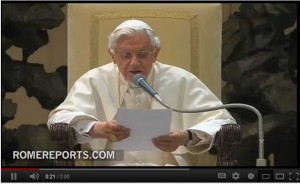
 – Benedict XVI today resumed his general audiences in the Vatican, having held them at Castelgandolfo during the month of August. Meeting with faithful in the Paul VI Hall he turned his attention to prayer in the Book of Revelation which, he explained, “presents us with the living breathing prayer of the Christian assembly, gathered together ‘on the Lord’s day'”.Revelation, Pope Benedict went on, “is a difficult book, but one of great richness. … In it a reader presents the assembly with a message entrusted by God to John the Evangelist. … From the dialogue between them a symphony of prayer arises which is then developed in many different forms up until the conclusion”.The first part of Revelation presents us with the assembly in prayer in three successive phases. The first of these highlights how “prayer is, above all, a listening to God Who speaks. Engulfed as we are by so many words we are little used to listening, and especially to adopting an interior and exterior attitude of silence so as to attend to what the Lord wishes to say to us. These verses also teach us that our prayers, often merely prayers of request, must in fact be first and foremost prayers of praise to God for His love, for the gift of Jesus Christ which brought us strength, hope and salvation. … God, Who reveals Himself as the beginning and the end of the story, welcomes and takes to heart the assembly’s request”.This first phase also includes another important element. “Constant prayer revives in us a sense of the Lord’s presence in our life and history. His presence supports us, guides us and gives us great hope. … Prayer, even that pronounced in the most extreme solitude, is never a form of isolation and it is never sterile, it is a vital lymph which nourishes an increasingly committed and coherent Christian existence”.In the second phase of the prayer of the assembly “the relationship with Jesus Christ is developed further. The Lord makes Himself visible, He speaks and acts, and the community, increasingly close to Him, listens, reacts and accepts”.In the third phase “the Church in prayer, accepting the word of the Lord, is transformed. … The assembly listens to the message, and receives a stimulus for repentance, conversion, perseverance, growth in love and guidance for the journey”.“The Revelation”, Benedict XVI concluded, “presents us with a community gathered in prayer, because it is in prayer that we gain an increasing awareness of Jesus’ presence with us and within us. The more and the better we prayer with constancy and intensity, the more we are assimilated to Him, and the more He enters into our lives to guide them and give them joy and peace. And the more we know, love and follow Jesus, the more we feel the need to dwell in prayer with Him, receiving serenity, hope and strength for our lives”.
[powerpress = Â Vatican_Radio]
Tags: book of revelation, pope benedict xvi
This entry was posted on Wednesday, September 5th, 2012 at 5:26 pm
You can follow any responses to this entry through the RSS 2.0 feed.
“Exposed: Inexcusable Me… Irreplaceable Him” by Shannon Dietz is a compelling book which chronicles her experiences growing up  in her devout Catholic home, dealing with realities of brokenness that  results from the assaults that come from the world, from the enemy and from our own negative choices, and the healing that comes from surrendering completely to the love of Jesus Christ.  Shannon shares her story of being raped, not once but twice, and the devastating effect it had on her life and self-image.  She would run from God and her Catholic faith for a time, which only led her to experience a greater period of isolation and despair.  Eventually she turned to Him and found the peace and strength she had been aching for in the Sacrament of Reconciliation.  That moment would provide a powerful encounter of grace and mercy and would set her once again on the path home to the loving embrace of the God the Father.  Her story is one that speaks to the hearts of several generation of women.  A powerful story and witness that there is indeed a beautiful “light at the end of the tunnel”. Shannon is the founder of “Hopeful Hearts Ministry“…be sure to visit the website!
in her devout Catholic home, dealing with realities of brokenness that  results from the assaults that come from the world, from the enemy and from our own negative choices, and the healing that comes from surrendering completely to the love of Jesus Christ.  Shannon shares her story of being raped, not once but twice, and the devastating effect it had on her life and self-image.  She would run from God and her Catholic faith for a time, which only led her to experience a greater period of isolation and despair.  Eventually she turned to Him and found the peace and strength she had been aching for in the Sacrament of Reconciliation.  That moment would provide a powerful encounter of grace and mercy and would set her once again on the path home to the loving embrace of the God the Father.  Her story is one that speaks to the hearts of several generation of women.  A powerful story and witness that there is indeed a beautiful “light at the end of the tunnel”. Shannon is the founder of “Hopeful Hearts Ministry“…be sure to visit the website!
[powerpress]
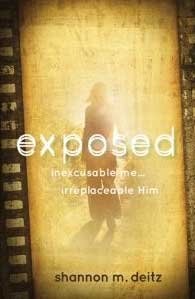 You can find the book here
You can find the book here
Patrice Fagnant–Macarthur, Sr. Editor of Catholic Lane, Author of “Letters to Mary from a Young Mother”
“It took great courage for Shannon to share her story. It is an important one for young people who are struggling with addiction or abuse and those who question whether God still cares for them.”
C.A. Webb, President of Conversations Book Club, Host of Conversations Live!
“A powerful book that helps us to live a life that is open to receive all that is meant for us.”
“Shannon’s candid sharing will prove to be a blessing to victims and those that care about them.”
Fr. Gavin Vaverek, Maria Goretti Network
Tags: choices, jesus christ, mercy, witness
This entry was posted on Friday, August 31st, 2012 at 6:29 am
You can follow any responses to this entry through the RSS 2.0 feed.
USCCA19 Chapter 18 -Â The Eucharist: Source and Summit of Christian Life
[powerpress]
Archbishop Lucas offers insights on the US Catholic Catechism for Adults Chapter 18:
It is called the Sacrament of Conversion because it makes sacramentally present Jesus’ call to conversion, the first step in returning to the Father from whom one has strayed by sin. It is called the Sacrament of Penance, since it consecrates the Christian sinner’s personal and ecclesial steps of conversion, penance, and satisfaction. It is called the Sacrament of Confession since the disclosure or confession of sins is an essential element of this Sacrament. In a profound sense, it is also a called “confession†—acknowledgment and praise—of the holiness of God and of his mercy toward sinful man. It is called the Sacrament of Forgiveness, since by the priest’s sacramental absolution, God grants the penitent “pardon and peace.†It is called the Sacrament of Reconciliation because it imparts to the sinner the love of God who reconciles: “Be reconciled to God†(2 Cor 5:20). He who lives by God’s merciful love is ready to respond to the Lord’s call: “Go, first be reconciled to your brother.†(CCC, nos. 1423-1424, citing Mt 5:24)
The Most Reverend George J. Lucas leads the Archdiocese of Omaha.Â
For other episodes in the visit our Archbishop George Lucas page
This programs is based on:
More information can be found here.
We wish to thank the USCCB for the permissions granted for use of  relevant material used in this series.
Also we wish to thank Bruce McGregor for his vocal talents in this episode.
[ezcc]
Tags: confession, penance, reconciliation, united states catholic catechism for adults, USCCB
This entry was posted on Monday, August 27th, 2012 at 7:39 am
You can follow any responses to this entry through the RSS 2.0 feed.
USCCA17 part 1- Episode 17-Â The Eucharist: Source and Summit of Christian Life
[powerpress]
Archbishop Lucas offers insights on the US Catholic Catechism for Adults Chapter 17:
The Church draws her life from the Eucharist. This truth does not simply express a daily experience of faith, but recapitulates the heart of the mystery of the Church. In a variety of ways, she joyfully experiences the constant fulfillment of the promise, “Lo, I am with you always, to the close of the age†(Mt 28:20), but in the Holy Eucharist, through the changing of the bread and wine into the Body and Blood of the Lord, she rejoices in this presence with unique intensity. Ever since Pentecost, when the Church, the People of the New Covenant, began her pilgrim journey towards her heavenly homeland, the Divine Sacrament has continued to mark the passing of her days, filling them with confident hope
The Most Reverend George J. Lucas leads the Archdiocese of Omaha.Â
For other episodes in the visit our Archbishop George Lucas page
This programs is based on:
More information can be found here.
We wish to thank the USCCB for the permissions granted for use of  relevant material used in this series.
Also we wish to thank Fr. Ryan Lewis and Bruce McGregor for their vocal talents in this episode.
[ezcc]
Tags: the eucharistic, the liturgy, the mass
This entry was posted on Monday, August 6th, 2012 at 10:09 am
You can follow any responses to this entry through the RSS 2.0 feed.
Holy Mary
From “Saints Speak”:
From heaven, in his own words, St. Alphonsus speaks on how the intercession of Mary is necessary for our salvation and shares the process of reviewing ones conscience before holy repentance..
Holy Repentance
Tags: blessed virgin mary, Holy Mary, holy repentance, repentance, st. alphonsus liguori
This entry was posted on Wednesday, August 1st, 2012 at 12:02 am
You can follow any responses to this entry through the RSS 2.0 feed.

